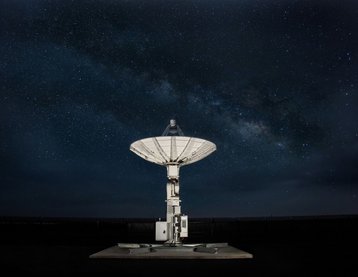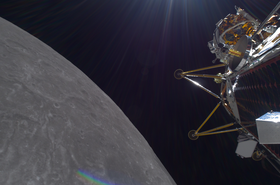Skynopy, a French startup providing ground station services for low Earth orbit (Low Earth Orbit) satellites, has completed a new €15 million ($17.7m) funding round.
In other space news, Logoshad raises $50m for its planned LEO constellation, and Lux Aeterna has raised $4m to develop reusable satellites.
Skynopy raises funds to expand ground network
Skynopy’s funding round was led by Alven, Expansion, Omnes, and CNES via the SpaceFounders program. Existing investor Heartcore also participated in this round.
The investment supports Skynopy’s aim to deploy a global network of high-throughput ground stations (S, X, and Ka bands), which can allow satellite operators with high data download needs to download large amounts of data quickly.
“By integrating the best existing infrastructure and focusing on practical, user-oriented value, Skynopy has built—in just a few short months—a service that is already being adopted by strategic clients,” said François Meteyer, partner at Alven. “We were particularly impressed by the team’s deep technical expertise, sharp commercial understanding of the market, and above all, their remarkable speed of execution. We are confident they have what it takes to become the next global leader in the satellite ground segment.”
Founded at the end of 2023, Skynopy has more than 15 antennas in its network, combining third-party ground stations from Amazon Web Services (AWS) and Kinéis with deployments of its own antennas. OneWeb Eutelsat is also named as a ground station partner on the company’s website.
Skynopy, whose leaders were previously at Loft Orbital, raised $3.1 million last year. The company reportedly supports a dozen customers, including French data provider Prométhée Earth Intelligence and Hemeria.
Pierre Bertrand, Skynopy co-founder and CEO, told SpaceNews the funding will support a “massive agreement” with an unnamed ground station partner, helping more than double the network to over 100 antennas in under three years.
AWS has 14 ground station locations globally, while IoT satellite firm Kinéis operates 20 ground station sites for its fleet of 25 nanosatellites.
Orange has been named as a partner on LinkedIn.
Logos raises $50 million for unjammable LEO fleet
Satellite firm Logos Space Services recently announced it has closed its Series A funding round.
US Innovative Technology (USIT) fund, a growth stage firm that invests in commercial companies with critical technologies relevant for the national interest, led the round, having been the main investor in the startup’s seed round last year.
“Enterprise users, not just governments, face an increasing number of sophisticated threats,” said Milo Medin, founder and CEO of Logos Space Services. “Our LEO constellation will offer resilient, symmetric, closed user group connectivity that enterprise users need, without depending on virtual private networks.”
Former Google VP Medin founded Logos Space last year. The company’s planned 4,178-satellite LEO constellation aims to deliver gigabit end-to-end connectivity that is “resilient to electronic warfare, jamming, and interference.”
The company plans to launch its first satellites, which will operate in the Q-, V-, and K-bands, in late 2027, pending FCC approvals.
Logos will use the funds from this latest round to hire engineering and technical staff for spacecraft, payload, and user terminal development. The funds will also support integration with spacecraft, government, commercial, and launch partners.
“I’ve been involved since the beginning, and am very excited by the customer demand we see for these innovative services,” said Thomas Tull, co-founder and chairman of USIT. “Milo and our team – veterans of Google, SpaceX, Amazon, Airbus, DARPA, and others – are exactly the right team that can pull off this challenging endeavor.”
Lux Aeterna emerges from stealth with $4 million to develop reusable satellites
New satellite company Lux Aeturna emerged from stealth with $4 million pre-seed funding round to develop a “fully reusable satellite bus.”
The round was led by Space Capital with participation from Dynamo Ventures, Mission One Capital, Alumni Ventures, Service Provider Capital, and strategic deep tech angels, including the co-founders of Dive Technologies.
The company aims to deploy its first spacecraft, known as Delphi, in 2027. It wants to make satellites that can be launched, returned, and redeployed like reusable rockets.
“We’re taking the high-risk, high-cost nature out of space missions and replacing it with reliability, flexibility, and reusability,” said Brian Taylor, founder and CEO of Lux Aeterna, and a former engineering leader at SpaceX, Amazon Project Kuiper, and Loft Orbital. “This funding is the first milestone in our mission to industrialize space through reusable infrastructure. While the satellite industry has evolved rapidly, its core infrastructure is still designed to be disposable. Lux Aeterna is changing that fundamental approach from the ground up.”
Justus Kilian, partner at Space Capital, said: “We backed Lux Aeterna because this team has been at the leading edge of satellite innovation for years—building some of the most advanced spacecraft at the most ambitious companies.
“That experience gave them a rare vantage point to rethink how satellites are designed, deployed, and reused. They’re not just iterating—they’re stepping boldly into what’s next. With the DoD actively seeking more dynamic and recoverable space platforms, this capability is urgently needed.”
Plan-S launches four IoT satellites
Turkish satellite firm Plan-S has launched four new Connecta IoT Network satellites.
Launched aboard the SpaceX Falcon 9 Transporter-14 mission last week, Plan-S now operates 12 IoT machines and 17 overall.
Connecta IoT-9, IoT-10, IoT-11, and IoT-12 will provide IoT connectivity in remote areas where terrestrial networks are limited or unavailable. The added machines will add nearly 40 percent capacity to the network.
More in Investment/M&A/Financing
Read the orginal article: https://www.datacenterdynamics.com/en/news/skynopy-raises-15m-to-build-out-ground-station-network/










